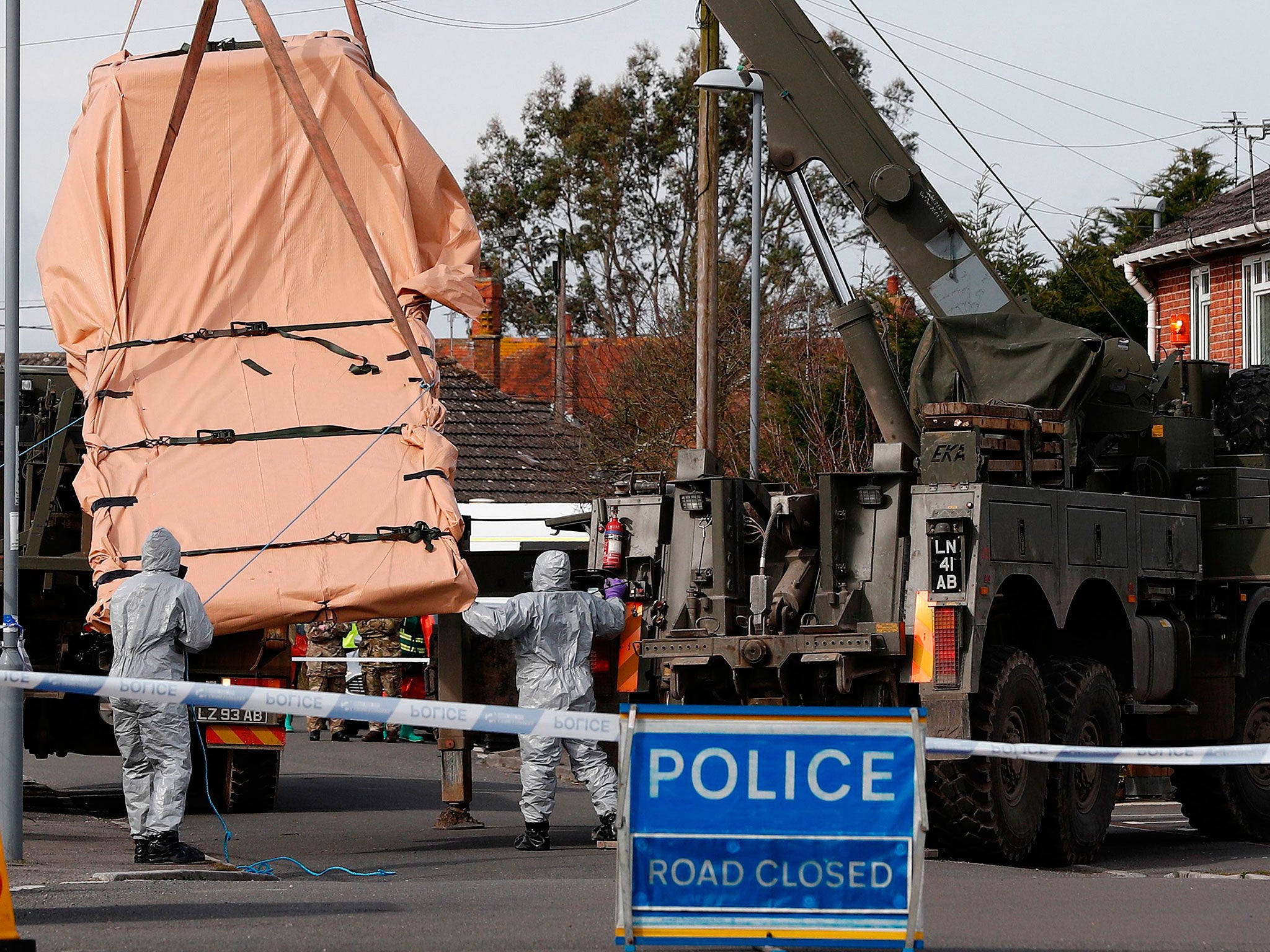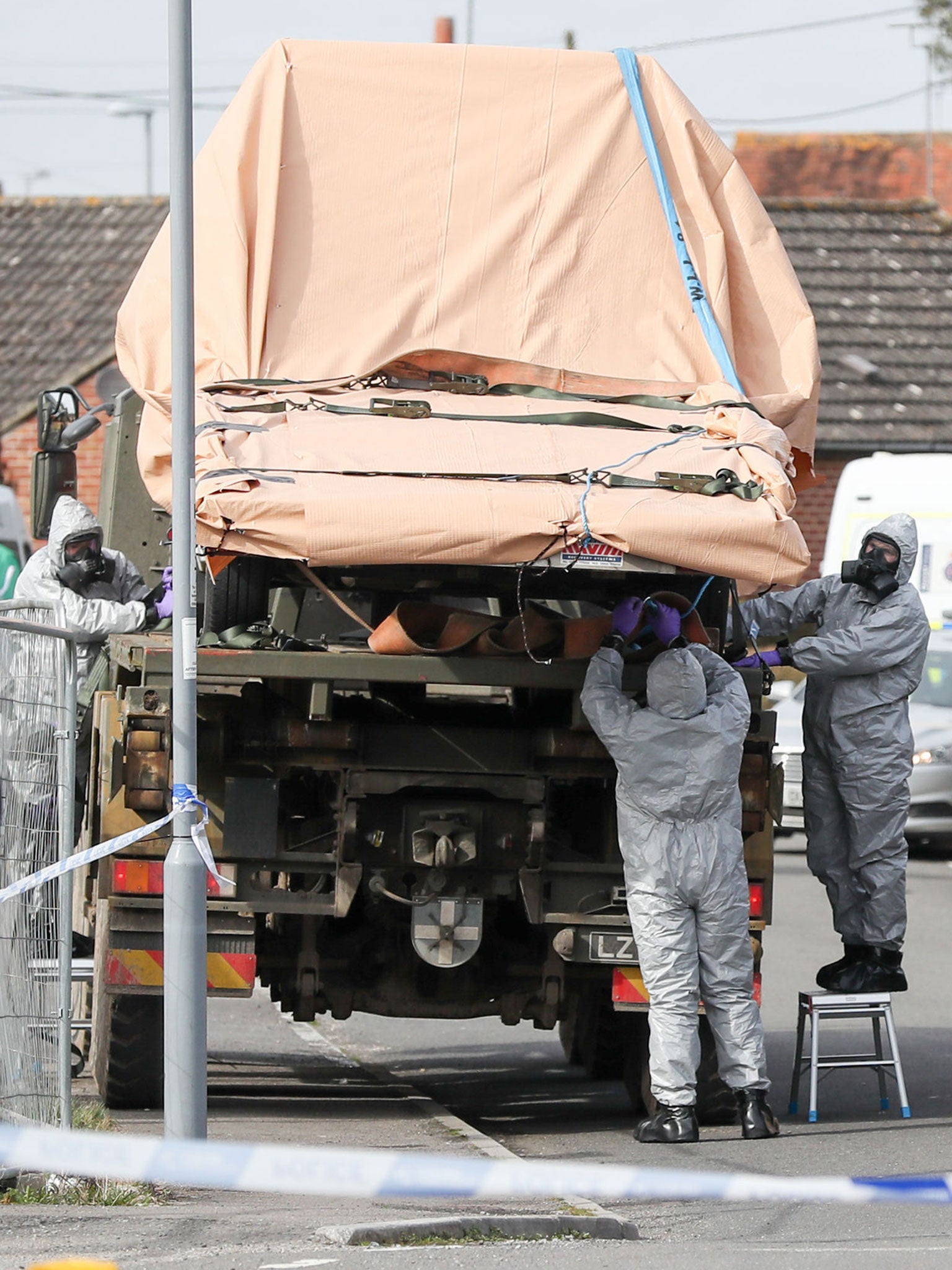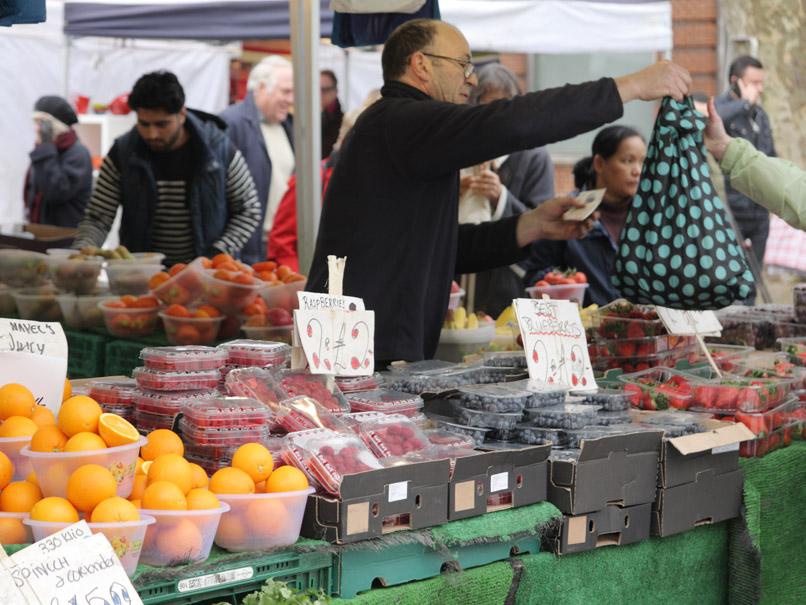Russian spy: Military operations expand to Dorset as police probe movements of Sergei Skripal's car
Police appealing for information on Mr Skripal’s movement in car amid questions over how nerve agent was administered

Military and police operations linked to the nerve agent attack on a former Russian spy have expanded to Dorset as investigators work to establish how the substance was administered.
Soldiers in masks and protective body suits were seen covering a tow lorry parked in Gillingham, which may have been used to move Sergei Skripal’s car following the assassination attempt.
The vehicle was winched onto an Army transport lorry and taken away for further investigation and tests for traces of deadly Novichok.
Local residents said police had already seized one lorry from Ashley Wood Motors, and had been monitoring the second vehicle for several days.
One resident told the Gillingham & Shaftesbury News that the driver had been taking it to work as normal, adding: “It’s been here all that time which is a worry for us if it was contaminated – anyone could have touched it.”
A spokesperson for the Metropolitan Police said members of the public “should not be alarmed” and public health advice has not changed.
“The military is assisting police to remove a number of vehicles and items from areas of Dorset, following the incident in Salisbury,” he added.

“The military has the expertise and capability to respond to a range of contingencies. The Ministry of Defence regularly assists the emergency services and local authorities in the UK. Military assistance will continue as necessary during this investigation.”
Speculation about how Mr Skripal was targeted has focused on his car since police issued a fresh appeal to speak to anyone who saw the 66-year-old, and his daughter Yulia, in the red BMW on the day of the attack.
There have been suggestions that Novichok may have been smeared on door handles or pumped through the ventilation system to expose the pair.
Metropolitan Police assistant commissioner for counterterrorism Neil Basu said investigators were tracing their movements around Salisbury between 1pm and 1.45pm on 4 March.
More than 250 police officers are currently working on the probe, assessing 380 pieces of evidence and hours of CCTV footage.
They have established that Ms Skripal had arrived at Heathrow Airport to visit her father on 3 March, and they arrived in the Sainsbury’s upper level car park in Salisbury’s Maltings shopping centre at 1.40pm the following day.
They went to The Mill pub before going to Zizzi’s for lunch, arriving at 2.20pm and leaving at 3.35pm.
Mr Skripal and his daughter were caught on CCTV leaving the restaurant on foot minutes later, and emergency services received the first report from members of the public who saw them slumped on a bench at 4.15pm.
The BMW was removed by authorities after the attack, as was another car belonging to Mr Skripal.
In his most recent statement, Mr Basu said he could not comment on how the nerve agent was administered but Theresa May identified it as deadly Novichok, which was developed by the Soviet Union.
The Prime Minister told MPs that the use of the “military-grade” nerve agent, and its record of assassinating defectors like Mr Skripal, made Russia the likely culprit for the “reckless and despicable act”.
Ms May said Russia had failed to provide a credible explanation of how Novichok was deployed in Wiltshire within her deadline – despite the Kremlin’s angry denials.
“They have treated the use of a military-grade nerve agent in Europe with sarcasm, contempt and defiance,” she added.
“There is no alternative conclusion other than that the Russian state was culpable for the attempted murder of Mr Skripal and his daughter – and for threatening the lives of other British citizens in Salisbury, including Detective Sergeant Nick Bailey.
“This represents an unlawful use of force by the Russian state against the United Kingdom.”
The Government is expelling 23 Russian diplomats, who have been identified as undeclared spies, in response to the attack – the largest such expulsion since the Cold War.
They have been given a week to leave, while the UK has also cut off all high-level contact, and government ministers and the royal family will boycott the summer’s World Cup.
Ms May said authorities would also freeze the assets of those responsible for human rights violations – tabling a “Magnitsky law” amendment to legislation currently going through Parliament strengthening sanctions powers – and halt those suspected of hostile state activity at the border.
The Russian embassy in London called the announcement an “unprecedented, flagrant provocation” and accused the British Government of trying to aggravate relations.
A spokesperson claimed Russia was prepared to cooperate with the Organisation for the Prohibition of Chemical Weapons and characterised the investigation as a “groundless anti-Russian campaign”.
“Needless to say, our response measures will not be long in coming,” she added.
Ambassador Alexander Yakovenko had been summoned to the Foreign Office ahead of Ms May’s statement, amid calls by MPs for him to be expelled from the country.
Mr Skripal and his daughter remain in a critical condition in intensive care, while a police officer who was among the first to respond to the incident is serious but stable.
Salisbury residents have been raising money for Detective Sergeant Nick Bailey, with a crowdfunding page so far raising £400.
A further 34 people have been assessed by doctors and discharged.
Dr Vil Mirzayanov, a former Soviet Union chemical weapons scientist who developed Novichok, believes they will not recover from the attack and claimed there was “no cure” for the deadly nerve agent.
Public Health England issued advice for people who have visited the Zizzi restaurant and The Mill pub the Skripals went to on the day of the attack to wash their clothes and belongings, but said the risk to public health was low.

With cordons remaining in place around Salisbury, Wiltshire Police went out to meet the public and speak to business owners about their concerns.
Chief constable Kier Pritchard and deputy chief constable Paul Mills described the atmosphere as “business as usual” in the city.
“The mood amongst the public seemed positive and it was heartening to see a bustling city centre, very much carrying on as normal,” Mr Mills said.
“The people of Salisbury have taken the extraordinary events of the past 10 days in their stride, and have shown nothing but resilience and community spirit during such a difficult time.
“Having said that we do understand the concerns of residents and businesses.
“As Public Health England has previously stated, the risk to the general public remains low, and we want to reassure people that their health and safety is at the forefront of everything the emergency services are doing.”
Ms Skripal had been on holiday visiting her father from Russia when the attack was launched.
Mr Skripal was jailed for “treason” by Russia in 2006, after working as a double agent for MI6 during his time as a colonel in the GRU military intelligence service.
He was released early in 2010, following a high-profile “spy swap”, with Russian sleeper agents uncovered in the US and given refuge in the UK and British citizenship.
Mr Skripal appeared to lead a quiet life in Salisbury but sources told The Independent he may have come to the attention of powerful enemies in Russia by “freelancing” for private intelligence firms run by former MI5, MI6 and GCHQ agents.
They insisted he was not an active MI6 asset and was not viewed as being under threat.